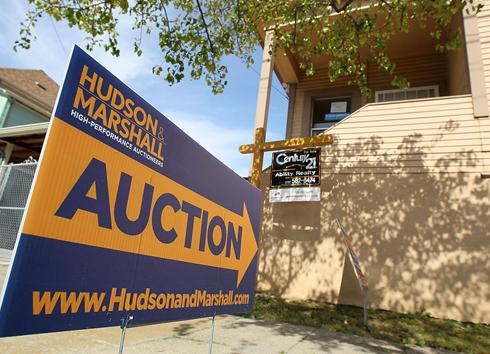Stephanie Armour
USA Today

A sign advertising an auction is posted in front of a foreclosed home in Oakland, California. By Justin Sullivan, Getty Images
Foreclosure filings dropped 2% in April from a year ago, the first annual decrease in more than five years, according to a report out Thursday.
The RealtyTrac report could signal that foreclosures have begun to plateau, economists say.
Foreclosure filings were reported on 33,837 properties in April, a 9% decrease from March, according to the report. One in every 387 housing units received a foreclosure filing during the month.
Nevada posted the highest state foreclosure rate for the 40th-consecutive month. One in every 69 housing units there received a foreclosure filing in April — more than five times the national average. Arizona and Florida ranked second and third.
Foreclosure filings include default notices, scheduled auctions and bank repossessions.
The decline in foreclosures is “telling us that the problem may be peaking. A lot of people had been saying it would be getting worse,” says Patrick Newport at IHS Global Insight, adding that the pace of foreclosures still will remain high. “It will still be a big problem through next year.”
Reasons for less foreclosure activity are:
• Job creation. A better job outlook means fewer homeowners will fall behind on their mortgages; unemployment has been a major cause of delinquencies. Non-farm payroll jobs rose by 290,000 in April and are up 573,000 since December, the government said last week.
• A stabilizing housing market. One sign is there were about 100,000 fewer residential properties with mortgages in negative equity in the first quarter than in the fourth quarter, according to CoreLogic. That means fewer borrowers owe more on their mortgages than their homes are worth. The improvement was slight — the more than 11.2 million properties underwater still equaled 24%, the same as in the fourth period.
• Tighter lending. Stricter credit standards for loans written since the housing bubble burst in 2006 mean mortgages taken out since then are less likely to become delinquent, says Mark Zandi at Moody’s Economy.com.
“The loans that have been originated are better quality; the people who got them are good credit risks,” Zandi says. “It is clear the foreclosure crisis is peaking. It looks like the crisis is past the worst.”
Still, bank repossessions hit a record monthly high in April even as default notices dropped substantially on a monthly and annual basis. That pattern is expected to hold as lenders systematically work through a backlog of distressed properties.

